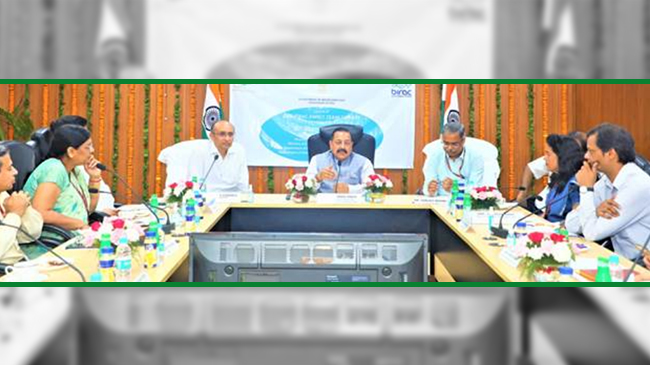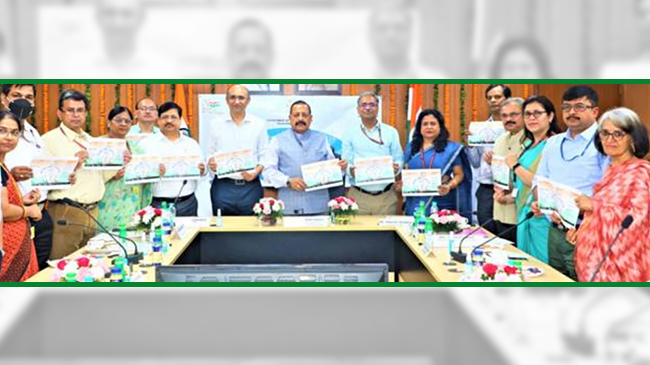Everything you need to know about the new ‘Amrit’ grants

Everything you need to know about the new ‘Amrit’ grants
What are Amrit Grants? Dr. Jitendra Singh, Minister of State for Science & Technology, has announced 75 Amrit grants for the biotech ecosystem, which include start-ups, businesses, academia, and research organisations working together. According to the minister, the Department of Biotechnology and Biotechnology Industry Research Assistance Council (DBT-BIRAC) Amrit team grant programme, would help the prime minister’s “Jai Anusandhan” plea. This project aims to propel India to global leadership by funding ambitious research concepts, and high-risk, milestone-driven collaborative research for knowledge-based discoveries with widespread verified applications from both academia and industry.
In his Independence Day speech this year, Prime Minister Narendra Modi emphasised the significance of Anusandhaan, saying, “Till this day, we remember our revered Lal Bahadur Shastri ji for his inspirational clarion call of ‘Jai Jawan Jai Kisan’, which translates to ‘Hail the Soldier, Hail the Farmer.’ We gave the new link, ‘Jai Vigyan’ — which means ‘hail science’ — the utmost importance when it was later introduced by Atal Bihari Vajpayee ji. ‘Jai Anusandhaan’, which means ‘hail innovation,’ must now be added to Amrit Kaal in this next phase.
“Jai Jawan Jai Kisan Jai Vigyan Jai Anusandhaan.”
By 2025, India’s bioeconomy goal is to grow from $70 billion to $150 billion, and this expansion will be possible only with the active participation of all sector stakeholders. The biotechnology sector will be the primary torchbearer of India’s developed economic status for the next 25 years, known as the Amrit Kaal period. It has been identified as among the important sectors that is growing rapidly. The Minister added that the Department of Biotechnology (DBT) funds various cross-disciplinary, multi-institutional efforts, including a few co-creative programmes on maternal health and pre-term birth, bioenergy, and the Indian SARS-CoV-2 Genetics Consortium (INSACOG) which is a forum set up to study and monitor genome sequencing and virus variation of circulating strains of COVID-19 in India.
Start-ups, enterprises, academic institutions, and research organisations can work together to form Team Science Grant in a Public-Private Partnership to obtain financing of Rs 10-15 crore over two to three years for high-quality, interdisciplinary research. The grants will largely be offered in the areas of health, agribiotech, climate change, synthetic biology, and sustainable bioresource management in order to address national goals and advance India as a global leader in biotechnology.

Government Development Initiatives
The government has worked hard to encourage research and development in the biotech sector under the National Biotech Development Strategy (NBDPS) 2011-2020. The NBDPS focuses on enhancing the R&D capabilities of universities and institutes, creating the infrastructure needed for conducting research and enhancing capacity through skill-building initiatives.
India is among the top 12 destinations for biotechnology worldwide. As of 2021, more than a thousand new biotech start-ups were registered. This is expected to go up to 10,000 by 2024.
More recently, the government has launched a unique Biotech Ignition Grant for India’s North Eastern Region (BIG-NER) at the Council of Scientific and Industrial Research (CSIR) in Delhi. 25 start-ups and entrepreneurs from the North East region would receive financial help from the fund of up to Rs 50 lakh, to create biotech solutions. Another huge stride in the Indian Biotechnology sector occurred when Uranium was successfully extracted from seawater by researchers at the Indian Institute of Science Education and Research (IISER) in Pune; their results were recently published in the Royal Society of Chemistry journal.
Biotech infrastructure to spur innovation
In India, the major limitation faced by new start-ups and entrepreneurs in the biotech sector is the need for huge capital investment. Additionally, there is a lack in understanding of technology, and the infrastructure facilities available in institutes. To resolve these issues, the government as well as the private sector is focusing its resources on building biotech parks that have state-of-the-art equipment and infrastructure, which facilitate biotechnology product research & development, entrepreneurship, commercialization, and innovation. Such facilities are already available in Hyderabad, Chennai, Guwahati, Jammu & Kashmir, and Pune.
The Future of Biotech in India
With the creation of complicated APIs, biologics, and vaccines, India’s life sciences sector is prepared to compete globally. The Covid pandemic forced the industry into a major transition, with quick regulatory approvals and increased acceptance of mRNA platforms. The $2 billion vaccination market in India has the potential to grow to $5 billion. However, doing so will necessitate increasing investment in manufacturing technology and supply chain infrastructure. India can become a leader in the global biotech market by creating the ideal biotech ecosystem and accelerating innovation.


